Last Updated on January 13, 2025 9:55 pm by INDIAN AWAAZ
As the Maha Kumbh 2025 unfolds, it continues to embody the essence of spiritual unity, cultural heritage, and human connection, making it a truly transformative experience for all who partake in its divine embrace.
AMN / WEB DESK
The Maha Kumbh 2025 commenced on January 13, 2025, the auspicious day of Paush Purnima, with unparalleled grandeur, marking the start of a 45-day-long spiritual and cultural celebration in Prayagraj. It began with an overwhelming display of faith, devotion, and spiritual unity, creating a spectacle reminiscent of the spiritual grandeur witnessed once in every 144 years. Thousands of devotees from across the globe gathered at the Sangam—the sacred confluence of the Ganga, Yamuna, and Saraswati rivers—to partake in the first holy dip of this monumental event.
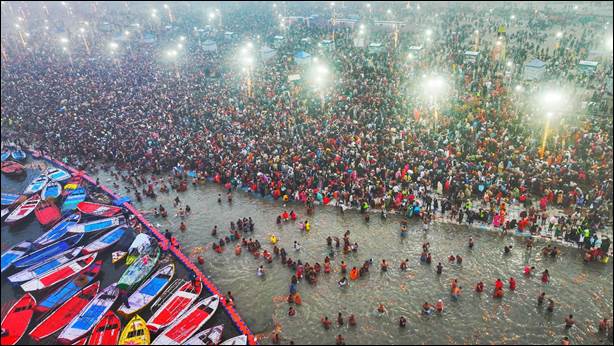
A Record-Breaking Start
On the first day, over 1.5 Crore devotees took the holy dip, signaling an auspicious beginning to the Maha Kumbh. This massive turnout not only underscores the event’s spiritual significance, but also highlights its role as a unifying force, bringing together people from diverse backgrounds in a shared celebration of faith and humanity.
Two days before the official bathing day, thousands of devotees had already begun arriving, signaling a record-breaking congregation. The Uttar Pradesh government’s meticulous arrangements for the Maha Kumbh 2025 garnered widespread appreciation. Devotees expressed their satisfaction with the well-organized infrastructure, which seamlessly managed the massive influx of visitors.
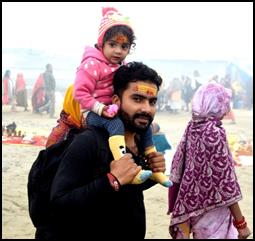
A Heartwarming Display of Unity and Security
The first bathing festival witnessed an overwhelming turnout as devotees, brimming with devotion and fervor, thronged the ghats. The Bhula-Bhatka camps, an essential feature of the Maha Kumbh, played a pivotal role in reuniting separated families amidst the sea of humanity. These camps, which included dedicated sections for women and children, ensured peace of mind for devotees who found themselves lost in the massive crowd. Loudspeakers installed along the ghats continuously broadcast announcements, facilitating the swift reunion of separated individuals. Police forces stationed at the venue worked tirelessly to assist attendees, ensuring the event remained serene and well-organized. In addition, the Khoya-Paya (Lost and Found) centers effectively utilized digital tools and social media to locate missing individuals, enhancing the safety and convenience of participants.
Makar Sankranti at Maha Kumbh
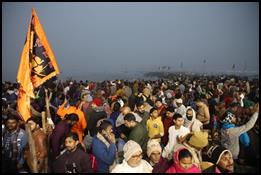
A massive gathering of devotees is flocking in from all over the world to the Maha Kumbh as the auspicious occasion of Makar Sankranti approaches. Pilgrims from across the nation are flocking to the sacred banks of Ganga, braving the piercing cold with unwavering enthusiasm. Carrying bundles on their heads and barefoot on the sands, they eagerly await the holy dip. Makar Sankranti will be celebrated on January 14 with Maha-Punya Kaal from 9:03 am to 10:50 am.
This year’s Sankranti holds special significance as there is no Bhadra, making the entire day auspicious. This festival marks the Sun’s transition into Capricorn from Sagittarius, heralding the beginning of Uttarayan. Bathing in holy rivers like the Ganga and Yamuna during Makar Sankranti is believed to cleanse sins and bestow spiritual merit. The day is also dedicated to acts of charity and devotion. Traditional dishes such as sesame-jaggery laddus, khichdi, and other festive treats grace the occasion. Kite flying, symbolizing vibrant energy and cheer, is a cherished tradition on this day.
Maha Kumbh’s Global Appeal
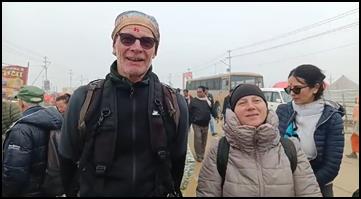
The Maha Kumbh has transcended national boundaries, drawing devotees and spiritual seekers from around the world. International pilgrims and tourists, including YouTubers from South Korea and visitors from Japan, Spain, Russia, and the United States, were captivated by the event’s grandeur. At the Sangam Ghat, many engaged with local guides to understand the cultural and spiritual essence of the Maha Kumbh. Christina from Spain described her experience as a “once-in-a-lifetime opportunity.”
The anticipated turnout for Maha Kumbh 2025 is expected to surpass the population of several nations, underlining its global significance. Foreign devotees not only witnessed but also actively participated in the rituals. Sadhus and sanyasis from various countries, having embraced Sanatan Dharma, took the holy dip, adding to the festival’s spiritual diversity.
Enhanced Infrastructure for a Seamless Experience
Recognizing the spiritual importance of the Sangam Snan, the Uttar Pradesh government undertook significant efforts to expand the bathing area. In a remarkable feat, the irrigation department reclaimed over 2 hectares of land at the Triveni Sangam within 85 days, enabling two lakh devotees to bathe simultaneously. Through the deployment of four dredging machines, 26 hectares of additional land has been reclaimed. This expansion, achieved through meticulous dredging operations, tripled the Sangam’s capacity compared to 2019. These enhancements have ensured a seamless bathing experience for the estimated 45 crore devotees expected during the Maha Kumbh.
Kalpvas: A Pillar of Sanatan Tradition

Kalpvas, an integral tradition of the Maha Kumbh, began on January 13 and will continue until February 12. According to ancient beliefs, Kalpvas begins on Paush Purnima and continues for a month until Magh Purnima. During this period, devotees reside in tents near the Sangam, adhering to strict spiritual discipline. To support this tradition, the Prayagraj Mela Authority set up 1.6 lakh tents equipped with essential facilities, including electricity, water, and sanitation. Special arrangements, such as affordable ration and cylinder distribution, secure bathing ghats, and bonfire provisions, ensure the comfort of Kalpvasis. Hospitals within the Mela area address health concerns, while Tirthpurohits and Prayagwals conducting rituals have been provided with additional facilities.
Kalpvasis, known for their intense spiritual discipline, took a holy dip in the ‘Mokshadayini’ Sangam, beginning their 45-day-long spiritual retreat. Observing vows of celibacy, simplicity, and regular prayers, they prayed for personal spiritual elevation and global welfare. The coincidence of Paush Purnima falling on a Monday, an auspicious day for worshiping Mahadev, amplified the spiritual significance of the event.
Market Areas of Maha Kumbh
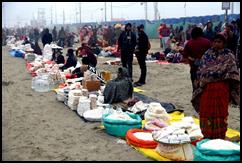
The Maha Kumbh’s vibrant energy extended to market areas near the Sangam Mela. Sellers of puja materials and tilak artists were seen busy attending to the swelling crowd of devotees. Retail vendors selling prasad and diya materials mentioned that the influx of pilgrims this year has surpassed even the 2019 Kumbh Mela. Pradeep Upadhyay, a local tilak artist, who also participated in the 2019 Kumbh, remarked that the enthusiasm and turnout in Maha Kumbh 2025 are much higher, indicating a greater spiritual connection among devotees. Similarly, Santoshi Devi, a vendor selling puja essentials near Sangam, noted that Ganga Jal storage boxes were among the most purchased items, reflecting the devotees’ eagerness to take back the sacred water as a symbol of divine blessings.
A Testament to India’s Spiritual and Cultural Heritage
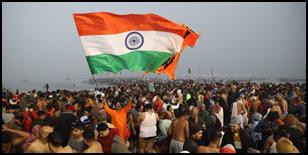
The Chief Minister of the Uttar Pradesh described Maha Kumbh 2025 as a proud symbol of India’s unity in diversity. He emphasized its global prestige as a manifestation of Sanatan culture and traditions. Extending a warm welcome to all attendees, he expressed hope that their spiritual aspirations would be fulfilled during this divine event.

